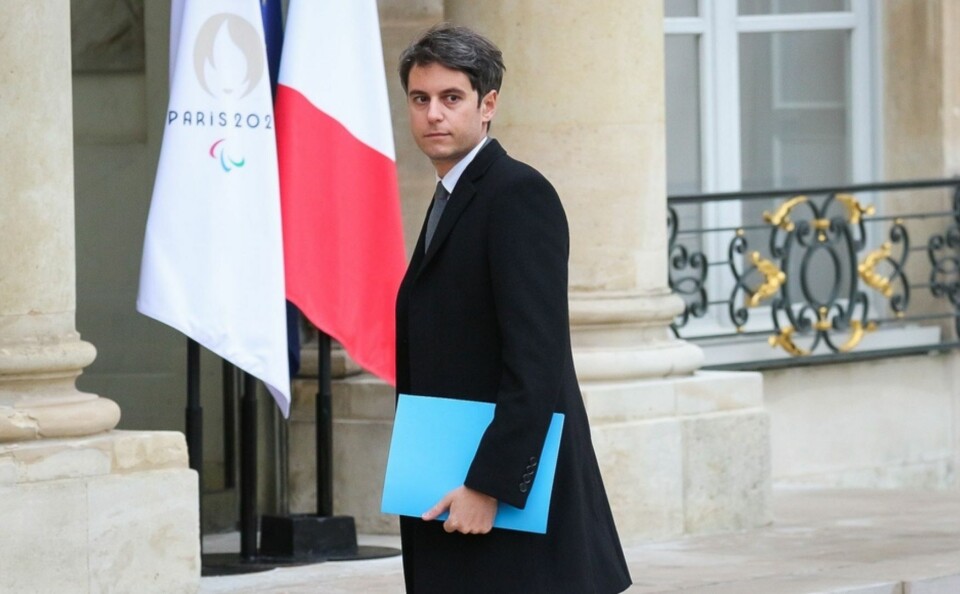-
Why calls for Emmanuel Macron to resign as president of France are misguided
The president should stay put, argues columnist Nick Inman
-
Readers report high customs charges on gifts sent to France
The cost of receiving gifts is sometimes higher than their value
-
France’s proposed voluntary national service: military revival or costly misstep?
Concerns have emerged over scheme's potential overlap with the recently abandoned Service national universel
‘Why France’s ‘boy wonder’ PM may still end up as Macron’s scapegoat’
Prime Minister Gabriel Attal may have presidential aspirations but consider the fate of his predecessors, warns commentator Simon Heffer

The only surprise about the new French government, led by former education minister Gabriel Attal, is that it did not happen sooner.
The administration of Elisabeth Borne, who has achieved the political equivalent of martyrdom after her 20 months in charge, was monochrome and embattled, like its prime minister.
Read more: President names Gabriel Attal prime minister of France
Elisabeth Borne never had a chance
Ms Borne has now, after a valiant but hopeless fight to make the Macron presidency look inspirational and accomplished, gone off to the graveyard where many premiers from the Fifth Republic have preceded her.
With no majority in the Assemblée national she never had much chance of carrying through radical reforms that might have created an air of vision, purpose or even excitement about this presidency.
And that raises the question of whether her youthful successor (one abhors remarks that might be construed as lacking in gallantry, but she is comfortably old enough to be his mother) has a prayer of doing any better.
After seven years in power Macron gets some new ideas
In a bizarre televised press conference after a reshuffle that transformed the look, if not necessarily the capabilities, of the government, Emmanuel Macron set an agenda for his ministers.
Read more: Tax cuts and foreign doctors: Macron's wishlist to revive France
He promised, using a phrase apparently minted by the right-wing agitator Eric Zemmour, that France would remain France.
He demanded a rise in the birth rate, something possibly beyond his control.
He promised a radical reshaping of the next generation of French children, who would be taught the Marseillaise, made to wear school uniforms and given citizenship lessons.
In a remarkably draconian move, he also said schoolchildren should have restricted use of mobile phones, computers and television.
He seemed to be telling the French that delinquency (improvements in law and order were also promised) was their fault for bringing up their children so badly: and that the state will now step in and tell them how to do it properly.
He promised deregulation and tax cuts: and as with all such promises, made by a leader who has been in power for nearly seven years, one was forced to ask why such policies had not been implemented before.
Ms Borne would certainly have had neither gumption or the ability to prevent them happening.
Policy shift to the right mirrored in Attal’s cabinet
The reasons for the shift to populist ideas such as these – or, as his strongest critics would have it, to the political right – is the looming presence of Marine Le Pen and her Rassemblement National in French political life, and the way her presidency is being spoken of as an inevitability after 2027.
To match the policy shift, the Attal cabinet looks decidedly more conservative than its predecessor.
Read more: Key points of new French prime minister’s traditional policy address
One of the darlings of French politics from the Sarkozy era, Rachida Dati, is back at the table, appointed minister of culture and having abandoned Les Républicains.
And Mr Attal’s successor as education minister, Amélie Oudéa-Castéra, affronts the left by having had the audacity to have her children educated privately.
Libération also claimed she lied about teacher absences in the state sector having forced her to move her eldest child to the private school. She will, at least, have recent experience of what a good school should look like, and may even be able to bring such standards more to bear in the state sector.
Read more: French education minister did not lie - ‘reality proved her wrong’
Mr Attal seems to tick all the boxes for a presidential campaign
The problem is that there is no obvious sign that the Macroniste political movement itself will be able to continue after 2027, when Mr Macron is forced to leave the stage under the constitution’s two-term rule.
And then there is the question of a suitable candidate to lead his movement, if it survives, into that election.
Mr Macron’s successor might appear to be Mr Attal who, at 34, is France’s youngest ever prime minister, and also the first to be openly homosexual.
If a supposedly right-wing agenda is to be delivered, it will be by someone who ticks important social-liberal boxes.
Read more: France’s new PM: The key difference in coverage in France and the US
Although brought up as an Orthodox Christian – his mother is part Russian – he is on his father’s side Jewish, at a time when the President has sought to counter a wave of anti-semitism in France that has reawakened disturbing memories from an inglorious past.
He has Tunisian heritage too, giving him something in common with France’s growing, and restive, community of North African descent.
Mr Attal began life as a socialist and has never had a job outside politics. He clearly has great flexibility, since more than half his cabinet began their political lives like Ms Dati in the parti conservateur.
Being prime minister is an expressway to the political graveyard
Mr Attal will be 38 by the time of the next presidential election, just a year younger than Mr Macron was when he won in 2017.
But Mr Macron had not been prime minister, usually an expressway to the political graveyard because of its traditional function as being a failed or failing president’s scapegoat.
Ms Borne made it clear that when she resigned, after a crisis over immigration and asylum legislation, she was sacked.
Political problems will get worse before they get better
Anyone who thinks the current political problems in France – be they economic, social or connected with international relations – will not get worse before they get better is not looking at the map.
Mr Attal is said to be the country’s most popular politician, but to survive to launch a presidential campaign in late 2026 will take more than talent and personality: it will require a great deal of good fortune.
It will also require a change of heart on the part of millions of French people, who seem to like the statist, welfarist and over-regulated nature of their country – whereas Mr Macron, quite correctly, does not.
It is that climate of opinion that Mr Attal and his predominantly right-of-centre team must set out to tackle.
One can depend on there being an organised opposition – think gilets jaunes – to any attempt to remove from the French people what a substantial number of them think are their rights.
That is what Mr Attal must negotiate, and to do so might be beyond even a boy wonder.
Related articles
‘No happy new year for French president chasing a place in history’
See: France’s new government with surprise return of Sarkozy minister
SEE: support for French farmer protests higher than for gilets jaunes
























